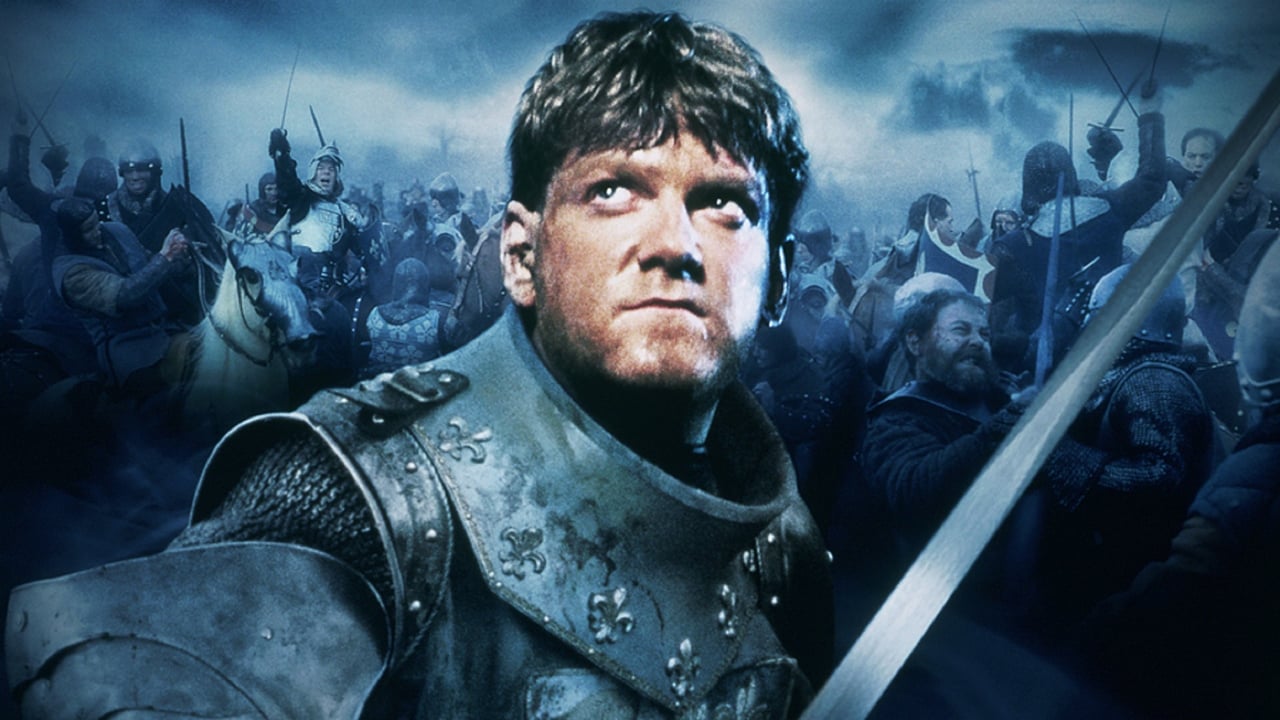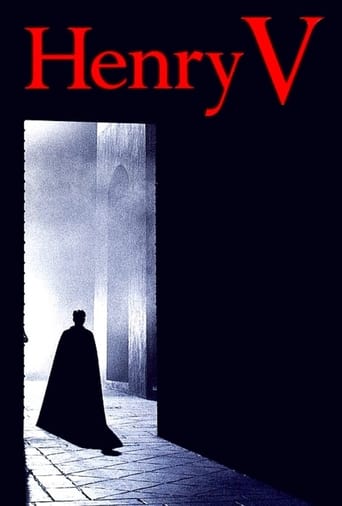

Pathetic attempt to match Olivier's 1944 masterpiece. Not quite as dreadful as Kenneth's later abysmal Hamlet, but sufficiently dire to be given a deliberate miss. From the moment you see a retarded teenager, just out of his egg, with lipstick and a comic modern haircut, shifting uneasily on his throne, you know you're in for a disaster. The enthusiasm for this appalling mess totally mystifies me. One truly good part was performed by the French herald, Montjoy, who actually dignified his role. The only other respectable part was played by Scofield, a genuine actor, as the French King. This could not be said of Branagh, who misdelivered and massacred every one of his speeches. Didn't he understand what he was shouting ? The flashbacks with Falstaff were simply grotesque. The pub regulars, Bardolph, Pistol, Nym, etc, resembled fugitives from a leper's colony. Brian Blessed came on as some sort of metal monster robot escaped out of Gotham City. Was he having Branagh on ? The remaining members of the tatterdemalion English contingent looked like a makeshift street-gang of undernourished jailbirds. Jacobi was adequate as the chorus, no more.The battle scenes were meaningless, ludicrous and interminable. Incredibly difficult to understand what was going on, but the English foot soldiers apparently charged headlong into the massed French cavalry. After that, the archers sent showers of arrows into the carnage. Fortunately, the arrows managed to pick out all the French, and spare the English. Remarkable; perhaps the shafts were fitted with special sensors. Although the comparative statistics of the slaughter were read out in the aftermath, there was no indication whatsoever of how these staggering figures had been achieved. The Olivier version indicated very clearly that it was the archers who had decisively won the day, long before there was any hand-to-hand fighting. And what about the ridiculous purse-stealing in the middle of the melée ? This wasn't Shakespeare. There's some sort of generation gap in connection with the praise heaped on Sir Kenneth Branagh. I just don't get it.
... View MoreHenry V, according to Shakesspeare's version of History, is well directed.And well acted. Well done all around.And since Shakespeare is best read instead of seen, it works very well in closed captioning. A liar is a person who says he/she understands the words as they are quickly sent out in these plays. In truth, they cannot be deciphered by the brain at such a pace, unless they are read.Personally, I didn't care for all the dim lighting, but it made for realistic dreary castle settings, if not for distinguishing what is going on. And it works for effect, because like black and white, dim lighting helps to focus on the story and not on all the distractions.What sets this Shakespeare play apart from nearly all other dramas and films is that most films show the warrior soldier as a father figure already, finished with his battle days.Here, we have the soldier hero as a young man, before he becomes the old hero. And it is very engaging.This Henry is a very likable character, and very three dimensional. It's refreshing to see a director treat a heroine as a "trophy", the beauty to be won, and of course it was written that way.Henry becomes like the coach giving the famous gung ho half time speech. However, there is more to him than just talk. We wonder what his battle strategy will be, and we're sure he has one. Indeed, though vastly outnumbered against the French, he does use his archers in a cunning way, with a troops of swords dashing out to the foray to hold the enemy at bay and in artillery range. With their swords at about 100 yards, the archers send their artillery barrage over their heads at about 150 yards, making the French between a rock and a hard place in three ways: 1. The French in front have no healthy reinforcements 2. The French in back must work their way over bodies, or be forced back 3. The French in front get into the artillery barrage if they retreat, so they have only one direction This is the play in which the king goes out among his men incognito, by the way.We really only get a good look at Henry and a couple of others. Many of the characters are well drawn, but fleeting in their appearance.
... View MoreDerek Jacobi's wonderfully proud, winking Chorus and Patrick Doyle's interesting (but barely) score are the sole redeeming features of this early Kenneth Branagh misfire. A gritty (in a BBC sense of the word) take on Shakespeare's mostly tedious historical play, "Henry V" gives far too much power to one man in the worst way that Branagh repeated so often to such bewildering acclaim. He not only directs and, rather pretentiously, "adapts for the screen" the words of the Bard, but also plays the title character. And sadly, he is by far no Olivier. The man has talent, to be sure, but it either wasn't here yet or it had fled temporarily when he took up this triple task. The only "flat, unraised spirit" here is Branagh himself, who essays a monotonous monarch with all the emotional depth of Keanu Reeves after an all-nighter. He even fumbles his one good instinct as a filmmaker: flashing back to "Henry IV" is an excellent way to provide backstory for people who aren't too familiar with the soap opera nature of some of Shakespeare's histories (which is primarily important here for the character of Falstaff), but the technique doesn't mesh with the rest of the picture. And why keep the Chorus? He's a purely theatrical device. He's there to tell us we have to imagine that we're in France or Southampton-- a necessity of the theater, in which all you can see is a stage and what's on it, but somewhat disconcerting in a film because the entire point of a film is to show us someplace we normally wouldn't see. Did he keep the Chorus to make his job, as a director, of sustaining our illusion that much easier? Whatever the motives (and no disrespect to the vibrant Jacobi), it was not the right decision. It's a boring, slow-to-evolve adaptation of a terrible, impossible-to-read play. (I am a fan of ol' Will, but his history plays are some of the most tedious dramas ever to plague the page.) If you're a fan of the kind of epic battle scenes of films as diverse as "Platoon" and "Gladiator," you'll definitely enjoy that aspect of the movie. Action-wise, it has its moments. But after a while, you just want Branagh to stick to doing one thing. Unfortunately, he's too self-indulgent to get that idea into his head.
... View MoreKenneth Brannagh's 1989 release of Henry V is definitely one of the greater adaptations off of a Shakespearean play. What really makes this film such a success is the big production that Brannagh had when he filmed this picture. Even though the Chorus reminds the viewer that the movie is just a mere imitation, I felt like I was looking at what it was like during the early 1400s. The costumes look very real, in fact, at the 1990 Academy Awards, the film won an Oscar for Best Costume Design. The production design and sets also add a sense of authenticity to the time period. The lighting in this film is unique, for it is generally low-key, giving both a literal and a figurative sense of darkness. This no doubt helped make the movie feel all the more dramatic and intense. The actors are perfect in their roles, whether it be the insignificant or the larger-than-life characters. One actor worth noting is Brian Blessed as Exeter. His encounter with the French king and the Dauphin is thoroughly amusing to watch. He not only carries the brutish demeanor of man ready to take on the whole French army, but he speaks coolly, delivering his lines carefully and fluently, all the while staring at the French king with terrifying eyes that makes him recoil. Simply brilliant! The real master of this film though is the main star and director Kenneth Brannagh. He does not merely act as King Henry V; he becomes the man. There are many great scenes where he displays his fierceness and determination as King Henry. One that comes to mind is when Henry is given the gift of tennis balls from France—an insult of calling him immature. As he speaks, threatening invasion of France to the Dauphin, there is an enraged confidence, yet restraint in his voice. It is obvious that he is dead serious about his threat, particularly when he refers to the French prince, "his balls have turned to gun-stones". Brannagh did not shout during this scene to strike fear in the Dauphin, for he did not have to. All it takes for Brannagh is one glance to scare a ferocious bear. Brannagh also reveals sheds of brutality and violence within Henry. When he finds out that three of his close associates had betrayed him, in a fit of rage, he grabs one of them and throws him on table. Henry then grabs the man's face, as he demands why he turned traitor. Once again, this explicitly shows that Henry is not a person to be feared or to be messed with. In short, Brannagh does not merely act as King Henry V; he becomes the man. As director, he proves in knowing how to suck a viewer into a film. The choice of shots throughout the film are excellent, whether it be the close ups during the heated debates or the three-minute long tracking shot that follows Brannagh as he carries a dead boy through the aftermath of Agincourt. I consider this shot to be one of the best scenes I have ever seen in cinema. Though Brannagh's film is a Shakespearean adaptation, it stands up as its own. It is perfectly acted and directed. If Shakespeare were alive to see this, he would be thoroughly impressed.
... View More